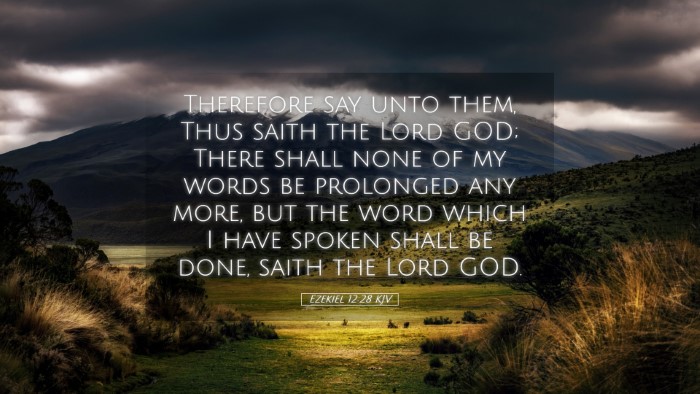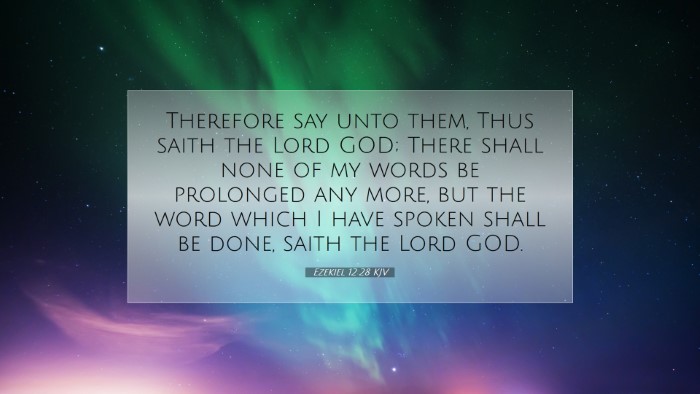Ezekiel 12:28 - Bible Commentary
Verse: "Therefore say unto them, Thus saith the Lord GOD; There shall none of my words be prolonged any more, but the word which I have spoken shall be done, saith the Lord GOD."
Introduction
The prophetic ministry of Ezekiel is rich with symbolism and profound theology. In Ezekiel 12:28, we encounter a declaration from the Lord emphasizing the immediacy and certainty of His word. This commentary will draw from public domain sources to provide insights for pastors, students, theologians, and scholars.
Contextual Analysis
This verse comes at a point in Ezekiel where the prophet is tasked with reassuring the exiled Israelites regarding the fulfillment of God's promises. The people are skeptical, questioning the long delay of the prophecies regarding Jerusalem's fall and their own restoration. In this context, God commands Ezekiel to assert that His words will not be delayed any longer.
Matthew Henry's Insights
Matthew Henry emphasizes the contrast between human expectations and God's timing. He notes that the Israelites had become accustomed to the delay of prophetic messages and reflected a general apathy towards divine warnings. Henry points out that the phrase "none of my words be prolonged anymore" underscores God's determination to fulfill His promises and warns against the dangers of disbelief. He encourages readers to take serious heed of God's declarations, as they are certain to come to pass.
Albert Barnes' Commentary
Albert Barnes focuses on the authoritative nature of God's pronouncements in this verse. He suggests that God’s assurance in saying "the word which I have spoken shall be done" is intended to eliminate any doubts in the minds of His people. Barnes interprets this as a powerful statement of the sovereignty of God; His plans will not be thwarted, and His words are a guarantee of forthcoming events. This reflects the steadfast nature of God's covenant promises, urging the reader to affirm their faith in His timing and fulfillments.
Adam Clarke's Perspective
Adam Clarke provides a detailed exploration of the original Hebrew terms used in this verse. He points out that the expression used conveys a sense of urgency and finality. Clarke highlights that the phrase “shall be done” signifies God's mighty action, a shift from prophetic waiting to fulfillment. He notes the pastoral implications—encouraging believers to trust in divine promises, showing that indecision and doubt are contrary to the nature of God. Clarke’s commentary serves as a reminder of the hope found in God’s fidelity to His word, especially in times of crisis.
Theological Implications
The promise conveyed in Ezekiel 12:28 has rich theological significance. It reinforces God's attribute of faithfulness, asserting that His word is sure and will be executed according to His divine timetable. This serves as both a warning to those who mock or neglect His prophecies and a comfort for those who await His promises. It challenges believers to embrace active faith in the face of delays and uncertainties, affirming that God’s purposes will unfold as designed.
Practical Applications
- Trust in God's Timing: Believers are encouraged to recognize the importance of waiting for God's promises to be fulfilled. This verse inspires patience and endurance, echoing the call to remain steadfast in faith.
- The Certainty of God's Word: Understanding that God's prophecies are not subject to human delay helps reinforce the belief in the reliability of Scripture. Pastors should emphasize this truth to their congregations.
- Responding to Doubt: The verse challenges leaders to address congregational doubts regarding God's promises, providing pastoral care through teaching and reassurance of God’s faithfulness.
- Encouragement in Trials: For those undergoing hardship or waiting on the Lord, this declaration serves as a powerful reminder that God acts decisively and that we can find hope in His promises.
Conclusion
Ezekiel 12:28 stands as a potent reminder of God's sovereign authority and the certainty of His words. As discussed by the insightful commentaries of Matthew Henry, Albert Barnes, and Adam Clarke, this verse calls believers into a deeper understanding of God’s timing, urging them to hold unwavering faith even in times of apparent delay. In a world marked by uncertainty, the assurance that God's word will be fulfilled provides profound hope and encouragement for all who seek to understand and live by Scripture.


